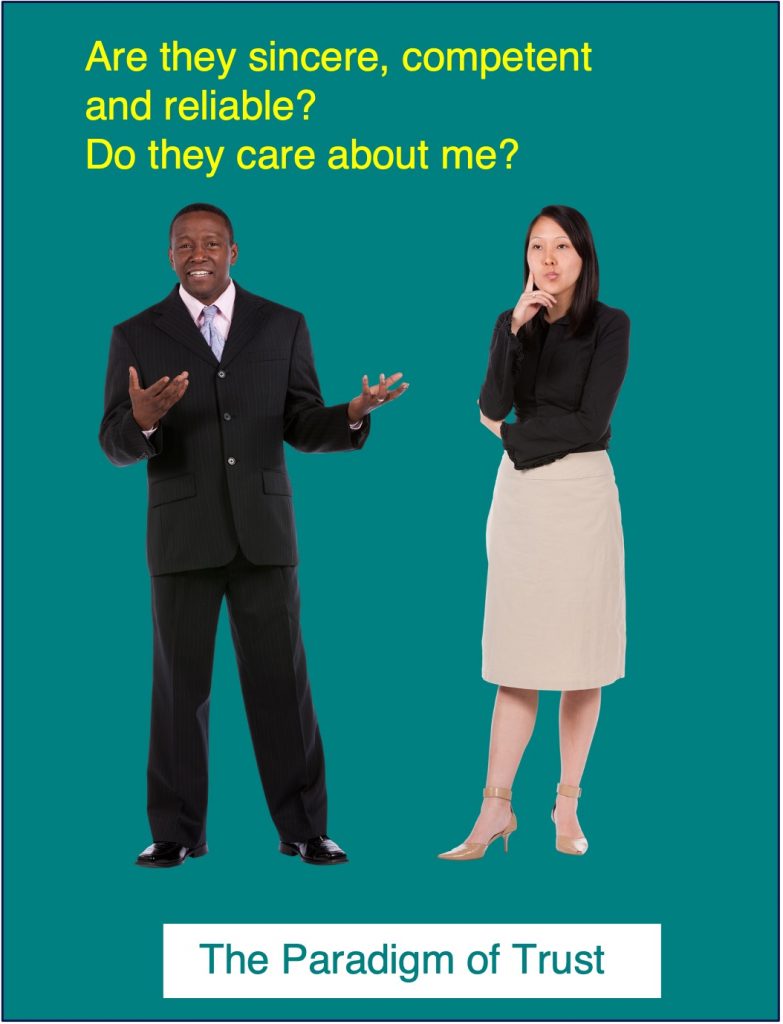
An alternative approach to the Paradigm of Control is the ‘Paradigm of Trust’. Trust is generally seen as the basis of healthy relationships and with good reason. Whereas the Paradigm of Control has the speaker’s interests at heart, those using the Paradigm of Trust seek to take care of all those involved. This does not mean that all people’s concerns will always be effectively addressed, but there would be an expectation they would be considered.
So, what is trust? Here, we refer back to the linguistic act of assessment.
Trust can be seen as a combination of four assessments we make of others:
- Sincerity
- Competence
- Reliability
- Involvement
Sincerity
Whenever we converse with someone else, there is not one conversation, but three occurring. Firstly, there is the ‘public conversation’, which we both hear.There is also a conversation we are each having with ourselves – our ‘private conversation’.
Ultimately, we will decide, and act based on our private conversations, not our public ones. How much we trust someone is based on our assessment of an alignment between their private and public conversations. This assessment is defined as ‘sincerity’. In essence, we are judging whether someone is telling us what they are actually thinking.
Competence
Most of our two-sided relationships involve some coordination of action to achieved our desired futures. We do things for and with each other. The basis of this cooperation is the promise and when a promise is made some future action is required to create a specific outcome(s).
As unique beings, we each have varying degrees of ability in certain domains of action. I am a pretty good golfer but a lousy ball room dancer. So, I would be a handy golfing partner if you were looking to win a golf event, but would probably step all over your toes in the world of ballroom dancing. As much of our relationships is based in the coordination of action, assessments of trust include another’s competence to fulfil their promises. This makes competence a key element of trust.
As we all have different abilities in various domains of action, assessments of competence are not all-encompassing but domain specific. The implication here is that we should not trust anyone completely. Trust me at golf but not ballroom dancing!
Reliability
Reliability is the third aspect of trust and is an assessment specifically about making and managing promises. We are involved in lots of promises in life; indeed, we all live in a web of promises. Given the unpredictability of life, we are sometimes unable to fulfil our commitments. Circumstances will change and we may decide other unforeseen breakdowns are more important. How well we honour our promises by completing them or handle the times when we cannot will impact on how others assess our reliability and trustworthiness. If we see someone as unreliable, then we may well be less likely to willingly cooperate with them.
Involvement
Finally, if trust is seen as the basis for developing good relationships it must involve an assessment of whether or not someone cares for our interests. In other words, do you have my best interests at heart? This aspect of trust is termed ‘involvement’.
We can assess someone as sincere, competent and reliable, yet still believe they do not care about us or our concerns. For instance, I could assess someone who is threatening me as being sincere in what they say, competent to do what they say and reliable in that they have a history of keeping their promises about their threats. However, in such a situation, their threats are not serving my best interests, nor do they serve to enhance a good relationship. Based on that, I would be very sceptical about the health of our relationship.
These four elements of trust speak to how we feel about others and inform the way in which we might relate to them in the future. When we feel we can trust someone, we are more likely to grant them personal authority. Ultimately, we will more willingly give personal authority to those we assess as more trustworthy. A better understanding of our assessments of trust also provides clues as to how we might build healthier relationships.
Respect
People are often confused about the distinction between respect and trust. Respect is defined in the Oxford Dictionary as “regard with deference, esteem or honour”. In this regard, respect speaks to an assessment we make of someone in terms of what we value about them. This does not mean we have to trust them in the way distinguished here. Depending on what someone values most, respect can be found in a combination of some of the four aspects of trust or the various aspects of the Paradigm of Control. It all depends on the observer and their standards. Hence when we look to why we might respect a person or an entity, we can look at our own values and see how they might generate that respect.
